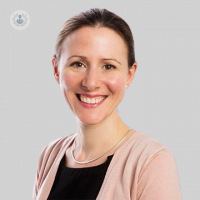Asthma in children: Symptoms and diagnosis
Written by:A persistent dry cough in children could have many possible causes, one being allergic asthma. Asthma requires effective management in order not to pose a grave risk to children’s health and so it is essential to have a good understanding of the signs of the condition. In this informative article, leading consultant paediatric allergist Dr Helen Brough gives expert insight on the symptoms to look out for and also explains how asthma is diagnosed in children of all ages.

How does asthma in children differ from asthma in adults?
Asthma in children is mostly allergic asthma, which means that it is driven by a type of cell in the lungs called the eosinophil and is usually associated with triggers from environmental allergens, such as house dust mite or grass pollen. This form of the condition is usually responsive to the standard treatments we prescribe for asthma including:
- inhaled steroids which prevent exacerbations or attacks
- reliever inhalers (usually blue) which help to relax the muscles in the airways to provide relief from symptoms
In adults, different types of asthma can be found and may be related to obesity, for example.
What are the most common symptoms of asthma in children?
The most common symptom of asthma in children is wheezing, which is a high pitched, whistling sound. A lot of parents think that wheezing is a more like a rattling sound at the back of the throat. However, that is actually more likely to be due to post-nasal drip caused by allergic rhinitis. Wheezing is most often heard when the child breathes out and is usually triggered by sudden exposure to cold weather, exercise, or if the child is having an asthma exacerbation.
Further to this, a persistent cough may be associated with uncontrolled asthma. This is most often a dry cough, often but not always, at night. There are, however, many causes of a cough and therefore it's important to go through a systematic approach to understanding the cause behind a chronic cough. For example, certain types of coughs, such as habit coughs, never occur at night, so that the timing as well as the characteristic of the cough are very important.
If a child is having an asthma attack, they can experience not only coughing and wheezing, but they can also develop difficulty breathing. This presents as an increase in the work of breathing and you may see your child breathing faster. In this situation, it's important that the child has a personalised asthma action plan so that the family know how to deal with the asthma attack.
How is asthma in children diagnosed?
Asthma is mostly diagnosed after the age of five, because from this age up, the child has the necessary motor skills to perform sophisticated breathing tests. A commonly performed test is spirometry, in which the child takes a deep breath in and then exhales as fast as they can to show how well they're able to blow outwards within the first second of breathing. One aspect of asthma is an obstruction of the airways, so an inability to breathe out quickly is indicative of the condition. If obstruction is found, then we give a Salbutamol inhaler to see if the obstruction can be reversed with this treatment. Additionally, there are other types of diagnostic tests for asthma, such as a breathing test called exhaled nitric oxide which looks for allergic inflammation of the lungs.
Although these tests form part of the standard diagnosis of asthma in children from five years and up, a medical history is also vitally important and this can be taken from a very early age, meaning a diagnosis can be given at any time. When we examine a child’s history of asthma-like symptoms, it’s crucial to know when the symptoms started. If they started from birth, this may be indicative of a structural problem whereas symptoms that develop later may have a different cause. Ruling out other conditions also forms part of the diagnostic process. This may include a chest infection or post-nasal drip due to house dust mite allergy, for example, which can lead to a wet cough.
Many children get recurrent viral infections and consequently can develop viral induced wheeze. In this case, the child only wheezes or coughs when they have a cold but they don't have any asthma symptoms in between colds.
Based on a clinical history and an examination, we can establish if asthma is likely. If this is the case, we can trial the use of inhaled steroids to see if it reduces or completely stops the asthma symptoms. We can also monitor the child using a strategy known as peak flows if they are over 5 years of age and continue to review and observe the effects of the medication. Peak flows are a way asthma patients can monitor their symptoms and is performed by breathing out three times in the morning and again in the evening to observe how fast they can breathe out within one second. This form of testing can help track symptoms and forms part of a child’s action plan to monitor and control their asthma.
Even during this diagnostic stage, it's very important to provide inhaler device training along with a prescription for Salbutamol or another reliever inhaler in case the child has an asthma exacerbation.
Does asthma in children ever go away?
Asthma in children often does go away, particularly with the onset of puberty. This is because there is an interaction between hormones and allergic asthma. Similarly, during pregnancy symptoms can improve or worsen. Some children experience resolution of asthma symptoms in puberty, before they return when they are an adult. Nonetheless, it is very important to manage asthma effectively with appropriate assessment and management, rather than waiting for it to resolve itself, as asthma can be fatal.
If you are concerned about your child’s asthma symptoms and would like to book a consultation with Dr Brough, you can do by visiting her Top Doctors profile.


